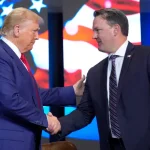Gov. Tim Walz (D-MN), the Democratic vice presidential pick, is being urged to address his National Guard service and clearly explain his time in uniform and departure after two decades.
“The reality is if he said one or two things that turned out to be maybe a little bit sloppy, fix it,” Democratic adviser Van Jones said on CNN. “Let’s just get this cleaned up and move on.”
While Walz has so far ducked questions about his description of his service and if he quit to avoid deployment to war in Iraq, the Harris campaign has tweaked his online resume, changing his rank from “retired command sergeant major” to just that he served at that rank before losing it because he didn’t complete the required courses.
However, he has made the false claim for years, and it has become part of his political profile. C-SPAN, for example, posted a video of Walz making the claim in 2006.
Even the supportive liberal Washington Post found that Walz has lied about his military service, though it toned down the grating language. The paper said on Friday: “Walz’s language was sloppy and false. He did carry weapons of war — just not in war.”
It is unclear if he wants to push back. But if Walz does, the last two presidential-level National Guard veterans provide a path of attack.
Former President George W. Bush showed the effectiveness of fighting back. His service in the National Guard was questioned by former CBS anchor Dan Rather. He pushed back hard, and eventually, Rather was shoved out of his chair.
Former Vice President Dan Quayle is also a leading example. When 1988 GOP nominee and Vice President George H.W. Bush picked the youthful Quayle as his running mate, the media seized on claims that the Indiana senator pulled strings to get into the National Guard as a way to duck the Vietnam War-era draft.
The attacks almost forced him out of the race, but Quayle decided to push back and hosted a raucous outdoor press conference in his hometown of Huntington, Indiana, the day after the Republican National Convention wrapped up.

“Staying on the offense and not allowing anyone else to set the agenda — not your opponents, not the media — is absolutely crucial to winning,” Quayle wrote in his memoir, Standing Firm.
In the book, he revealed that he considered dropping out until his wife Marilyn said bluntly, “Well, if you get out now, everyone for the rest of your life will believe it is true … you have to stay and you have to fight.”
SEE THE LATEST POLITICAL NEWS AND BUZZ FROM WASHINGTON SECRETS
Three days after the outdoor press conference that saw supporters jeering the media, Quayle’s hometown put up a plaque on the site heralding the “Battle of Huntington.”
The battle marked the beginning of antagonistic relations between the White House and its press corps that have lasted through today. Four years later, with his campaign under siege, Bush gave rallygoers red hats with the words “Annoy the Media Re-Elect Bush” on them.
























